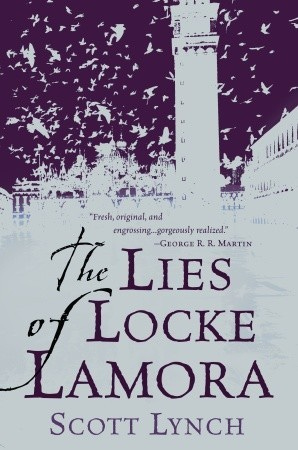The Lies of Locke Lamora
The Lies of Locke Lamora is without a doubt one of the most inventive fantasy novels I’ve ever read. It combines timeless, well-loved tropes with simple, yet detailed and intriguing world building and a plot that defies my best attempt at summarising. So, to whet your appetites, here’s the description straight from the back of the book:
The Thorn of Camorr is said to be an unbeatable swordsman, a master thief a friend to the poor; a ghost that walks through walls.
Slightly built and barely competent with a sword, Locke Lamora is much to his annoyance, the fabled Thorn. And while Locke does indeed steal from the rich (who else would be worth stealing from?), the poor never see a penny. All of Locke’s gains are strictly for himself and his tight-knit band of thieves: The Gentleman Bastards.
The capricious, colourful underworld of the ancient city of Camorr is the only home they’ve ever known. But now a clandestine war is threatening to tear it apart. Caught up in a murderous game, Locke and his friends are suddenly struggling just to stay alive...
The primary strength of this novel, however, lies not in its plotting or world building but in the narrative voice. Full of humour and wit, this is a voice that charmingly lures the unsuspecting reader deeper and deeper into the tangled plot. I am usually a quiet reader, slow to cry and even slower to laugh. Even so, The Lies of Locke Lamora kept me snorting with laughter throughout and, in some of the more poignant moments, even managed to stir me to tears.
The voice is complemented by Lynch’s unique cast of characters. While most of them seem to slot into an archetypal mould—the hero, the fighter, the sneak thief, the magician—Lynch adds new, surprising elements which breathe life into these mainstays of fantasy. Our hero, Locke, for instance, is unable to wield a sword, is thin to the point of consumption and possesses a moral compass that is faulty to say the least.
I also really appreciated the ideas the novel tapped into, especially the elements of metafiction. This is a story that is at least partially concerned with the art of telling stories—or, rather, telling very convincing lies. Lynch’s narrative structure, which seems aimed at keeping the reader in the dark about some of these lies until climactic moments of grand reveal, does sometimes trip itself up by destroying the otherwise well developed narrative tension. However, this structural flaw is one that recedes as the narrative continues and is barely noticeable as the core of the story is unfolding.
I would whole-heartedly recommend The Lies of Locke Lamora to any fans of fantasy, particularly those who appreciate Terry Pratchet’s droll wit and Patrick Rothfuss’ gritty world building and narrative devices.

